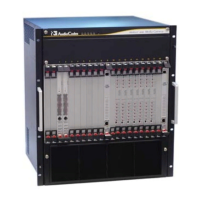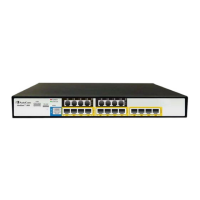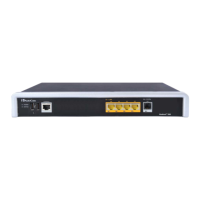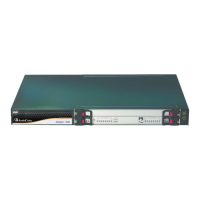Version 7.2 367 Mediant 800B Gateway & E-SBC
User's Manual 17. Control Network
Parameter Description
To configure SRDs, see Configuring SRDs on page 347.
Note:
The parameter is mandatory.
For the parameter to take effect, a device reset is required.
General
Index
[IPGroup_Index]
Defines an index for the new table row.
Note: Each row must be configured with a unique index.
Name
name
[IPGroup_Name]
Defines a descriptive name, which is used when associating the row in
other tables.
The valid value is a string of up to 40 characters.
Note: Each row must be configured with a unique name.
Topology Location
topology-location
[IPGroup_TopologyLocatio
n]
Defines the display location of the IP Group in the Topology view of the
Web interface.
[0] Down = (Default) The IP Group element is displayed on the lower
border of the view.
[1] Up = The IP Group element is displayed on the upper border of
the view.
For more information on the Topology view, see 'Building and Viewing
SIP Entities in Topology View' on page 388.
Type
type
[IPGroup_Type]
Defines the type of IP Group:
[0] Server = Applicable when the destination address of the IP Group
(e.g., ITSP, Proxy, IP-PBX, or Application server) is known. The
address is configured by the Proxy Set that is associated with the IP
Group.
[1] User = Represents a group of users such as IP phones and
softphones where their location is dynamically obtained by the device
when REGISTER requests and responses traverse (or are
terminated) by the device. These users are considered remote (far-
end).
Typically, this IP Group is configured with a Serving IP Group that
represents an IP-PBX, Application or Proxy server that serves this
User-
type IP Group. Each SIP request sent by a user of this IP Group
is proxied to the Serving IP Group. For registrations, the device
updates its registration database with the AOR and contacts of the
users.
Digest authentication using SIP 401/407 responses (if needed) is
performed by the Serving IP Group. The device forwards these
responses directly to the SIP users.
To route a call to a registered user, a rule must be configured in the
Tel-to-IP Routing table or SBC IP-to-IP Routing table. The device
searches the dynamic database (by using the Request-URI) for an
entry that matches a registered AOR or Contact. Once an entry is
found, the IP destination is obtained from this entry and a SIP
request is sent to the destination.
The device also supports NAT traversal for the SIP clients located
behind NAT. In this case, the device must be defined with a global IP
address.
[2] Gateway = (Applicable only to the SBC application.) In scenarios
where the device receives requests to and from a gateway

